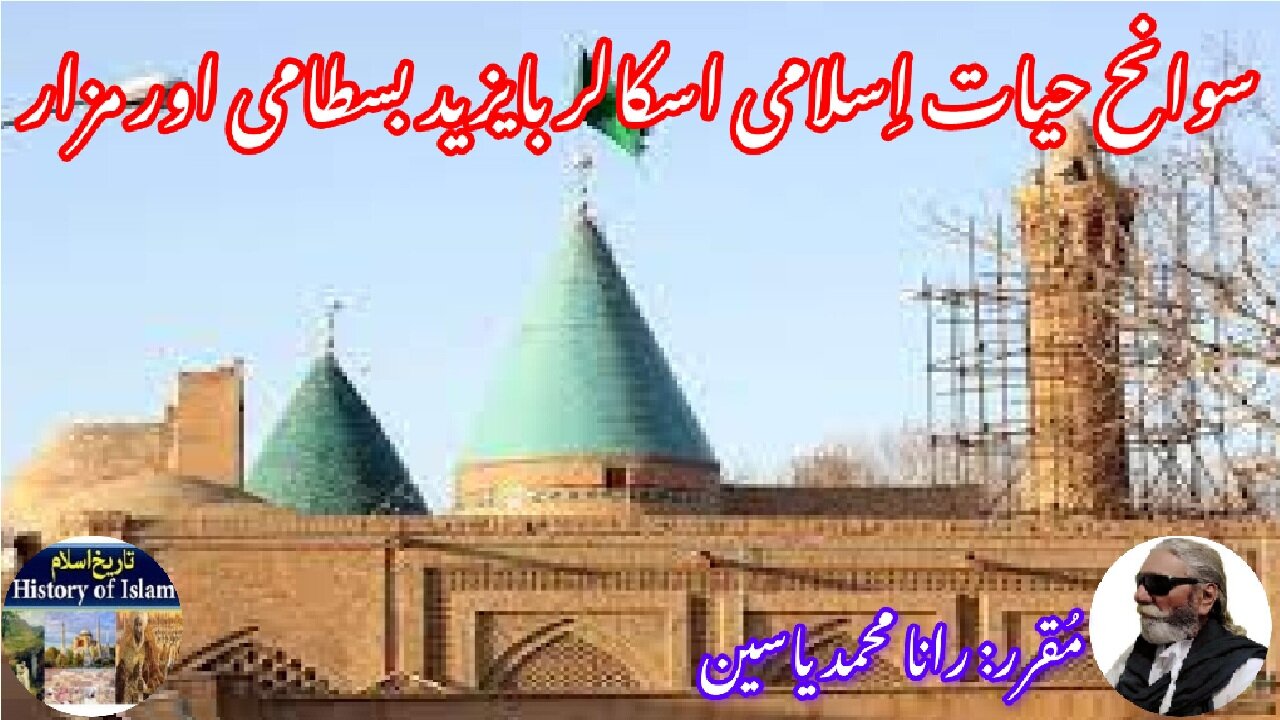Premium Only Content

Bayazid Bastami and the history of his shrine بایزید بسطامی کی سیرت اور ان کے مزار کی تاریخ
@islamichistory813 #sufisaint #culturalheritage #biography #bayazidbastami #islamicmysticism #islamicphilosophy #shrine #historicalfigures
Biography of Bayazid Bastami and the history of his shrine.
Bayazid Bastami, also known as Abu Yazid al-Bistami, was a significant figure in the early development of Sufism, born around 874/5 CE in the city of Bastam, located in present-day Iran. The region was known for its rich spiritual heritage and was a center for various philosophical and religious thoughts. Growing up in this environment, Bayazid was exposed to a variety of influences that would shape his spiritual journey.
From a young age, Bayazid exhibited a profound inclination towards spirituality and a quest for deeper understanding. His early education was primarily informal, involving study under local scholars who taught him the basics of Islamic teachings. He was particularly drawn to the Quran and the Hadith, which laid the groundwork for his later mystical explorations. As he matured, his thirst for knowledge led him to seek the guidance of renowned spiritual teachers in the region.
The formative years of Bayazid's life were marked by intense contemplation and reflection. He often retreated into solitude, spending time in prayer and meditation. This inclination towards asceticism would define much of his later life and teachings. His early experiences instilled in him a sense of longing for divine connection, prompting him to embark on a journey that would ultimately lead him to the depths of Sufi mysticism.
Bayazid Bastami's quest for knowledge took him beyond the confines of his hometown. He traveled to various centers of learning, seeking out prominent scholars and Sufi masters. His education encompassed a wide array of subjects, including theology, philosophy, and poetry. He was particularly influenced by the teachings of Sufi mystics who emphasized direct experience of the Divine.
During his travels, Bayazid encountered various spiritual traditions, which enriched his understanding of mysticism and the nature of God. He studied under the guidance of notable figures such as the Sufi master Abu Ali Farghani, whose teachings on the inner dimensions of faith deeply influenced him. Through these interactions, Bayazid developed a unique perspective on spirituality, integrating different philosophical insights into his understanding of Sufism.
Bayazid's spiritual development was characterized by profound mystical experiences that often defied conventional understanding. He spoke of a state of spiritual intoxication—a deep connection to the Divine that transcended ordinary consciousness. This concept of "spiritual intoxication" became a hallmark of his teachings, emphasizing the transformative power of love and the direct experience of God's presence.
As he delved deeper into Sufism, Bayazid began to formulate his ideas on the nature of reality, the self, and the Divine. He posited that true knowledge of God could only be attained through direct experience rather than mere intellectual understanding. This emphasis on experiential knowledge distinguished him from other scholars of his time, marking him as a pioneer of mystical thought.
Bayazid Bastami's teachings were deeply rooted in the idea of unity with the Divine. He often articulated the concept of annihilation of the self (fana) in the presence of God, suggesting that true spirituality involves transcending the ego and surrendering to the Divine will. His mystical insights resonated with many, leading to a growing following among those who sought a deeper connection with God.
One of the central themes of Bayazid's philosophy was the idea of spiritual intoxication, which he described as a state of divine ecstasy and union with God. He believed that this intoxication could be experienced through love and devotion, leading to a profound sense of oneness with the Divine. Bayazid's eloquent expressions of this state of being captured the imaginations of his followers, contributing to the development of Sufi literature.
His teachings emphasized the importance of love as the primary force driving the spiritual journey. Bayazid often spoke of love as a transformative power that could elevate the soul and bring one closer to God. He urged his followers to cultivate love for God and for all of creation, viewing this love as the pathway to spiritual fulfillment.
Bayazid was known for his unconventional approach to spirituality, often challenging established norms and practices. He spoke openly about his experiences and insights, sometimes employing paradoxical statements that provoked thought and reflection. This fearless articulation of his beliefs made him a controversial figure in some circles, yet it also endeared him to many who resonated with his emphasis on direct experience over dogma.
Bayazid Bastami passed away in 848/9 CE, leaving behind a rich legacy that would profoundly influence the course of Sufi thought. His teachings and experiences continued to inspire generations of mystics and scholars, solidifying his position as a foundational figure in Sufism. His emphasis on experiential knowledge and the transformative power of love laid the groundwork for later Sufi thinkers and poets.
After his death, Bayazid's followers began to compile his teachings and anecdotes, preserving his insights for future generations. His legacy continued to flourish, as his ideas were disseminated through oral traditions and written texts. The principles of love, unity, and spiritual intoxication that he championed became central tenets in Sufi thought, influencing figures such as Rumi and Ibn Arabi.
The impact of Bayazid's teachings can be seen in the continued evolution of Sufi practices and literature. His concept of spiritual intoxication has been explored and expanded upon by subsequent Sufi poets, leading to a rich tradition of mystical poetry that emphasizes the ecstatic experience of divine love. This tradition continues to resonate with seekers of spiritual truth, drawing individuals to the depths of Sufi mysticism.
Bayazid Bastami's burial site is located in Bastam, Iran, where a shrine was constructed in his honor. The Shrine of Bayazid Bostami has become a revered site for pilgrims and spiritual seekers who wish to pay their respects to the esteemed Sufi master. The architectural design of the shrine reflects the rich cultural heritage of the region, featuring intricate tile work and inscriptions that celebrate Bayazid's teachings.
The shrine serves not only as a resting place for Bayazid but also as a center for spiritual gatherings and commemorative events. Pilgrims visit the site to offer prayers, seek blessings, and engage in communal acts of remembrance. The atmosphere at the shrine is imbued with a sense of devotion and reverence, creating a space where individuals can connect with the spiritual legacy of Bayazid.
Various rituals and practices are associated with the shrine, including recitations of Bayazid's teachings and the performance of Sufi poetry. These gatherings foster a sense of community among devotees and provide an opportunity for spiritual reflection. The shrine also hosts events that encourage dialogue and exploration of Bayazid's teachings, ensuring that his wisdom continues to inspire new generations.
The Shrine of Bayazid Bostami has become a cultural and spiritual landmark in the region, attracting visitors from diverse backgrounds. It serves as a testament to the enduring impact of Bayazid's teachings and the universal quest for spiritual truth. The site plays a vital role in preserving and promoting Sufi traditions, inviting individuals to explore the depths of spirituality.
Bayazid Bastami's legacy extends beyond his teachings; it has also contributed to the broader cultural landscape of Iran and the Islamic world. His emphasis on love and unity resonates with the values of tolerance and compassion, encouraging individuals to seek common ground in their spiritual pursuits. This commitment to inclusivity has become a hallmark of Sufi thought and practice.
The influence of Bayazid's teachings can be seen in the rich tradition of Sufi literature and poetry that emerged in the centuries following his death. Many poets drew inspiration from his concepts of spiritual intoxication and love, creating works that captured the essence of the Sufi experience. This literary heritage continues to inspire contemporary poets and writers, reflecting the timeless appeal of Bayazid's insights.
Bayazid's ideas have also found expression in various artistic forms, including music and dance. Sufi rituals often incorporate elements of performance, allowing individuals to experience the ecstatic dimensions of spirituality. The celebration of Bayazid's legacy through these artistic expressions serves as a reminder of the vibrant cultural heritage that Sufism has contributed to the Islamic world.
In contemporary times, Bayazid Bastami's teachings remain relevant in discussions on spirituality, ethics, and the nature of existence. His emphasis on direct experience and inner transformation resonates with individuals seeking deeper meaning in their lives. As the world grapples with various challenges, the principles championed by Bayazid offer a path toward love, compassion, and unity.
Bayazid Bastami's life and teachings represent a pivotal chapter in the history of Sufism and Islamic spirituality. His commitment to love, experiential knowledge, and spiritual intoxication has left a profound legacy that continues to inspire individuals around the world. Through his teachings, Bayazid challenged conventional norms and opened new pathways for spiritual exploration.
The Shrine of Bayazid Bostami stands as a testament to his enduring impact, inviting pilgrims and seekers to connect with his spiritual legacy. As the principles of love and unity permeate the Sufi tradition, Bayazid's insights continue to resonate, encouraging individuals to embark on their own journeys of self-discovery and divine connection. His life serves as a reminder of the transformative power of love and the quest for deeper understanding in the human experience.
With that, please allow us until tomorrow, tomorrow we will be described biography of Islamic Scholar Sufi Sanit Bibi Jamal Khatun and the history of his shrine.
=======================
-
 11:56
11:56
IsaacButterfield
1 day ago $0.14 earnedYou're Racist If You Don't Marry Your Cousin
2.28K2 -
 8:11
8:11
MichaelBisping
21 hours agoBISPING Reacts: 'Sign me UP!!' Charles Oliveira CALLS OUT Max Holloway for BMF TITLE FIGHT!
1.75K1 -
 12:38
12:38
NC Dirt Hunter
23 hours agoIncredible Civil War relic sticking right out of the ground! Metal Detecting an old plantation.
2182 -
 44:36
44:36
TheTapeLibrary
15 hours ago $1.91 earnedThe DARK Truth About the Pollock Family Tragedy
9.2K5 -
 1:11:01
1:11:01
The Charlie Kirk Show
8 hours agoTHOUGHTCRIME Ep. 70 — Seatgate? Best Executive Orders? Panda Express?
111K13 -
 2:04:23
2:04:23
Kim Iversen
12 hours agoINCREDIBLE: Trump RELEASES JFK Files & BANS Central Bank Digital Currency
164K187 -
 1:12:22
1:12:22
Side Scrollers Podcast
15 hours agoThe Real Game Awards: Official Live Stream
105K15 -
 59:48
59:48
The StoneZONE with Roger Stone
8 hours agoJanuary 6 Victim Jeremy Brown Still in Jail Despite Trump Pardon | The StoneZONE w/ Roger Stone
64.9K13 -
 1:45:44
1:45:44
megimu32
10 hours agoON THE SUBJECT: Make 90s Movies Great Again
51.9K10 -
 59:46
59:46
Man in America
16 hours agoAI mRNA Vaccines, Turbo Cancer & Blood Clots... What Could Go Wrong?! w/ Tom Haviland
59.4K44